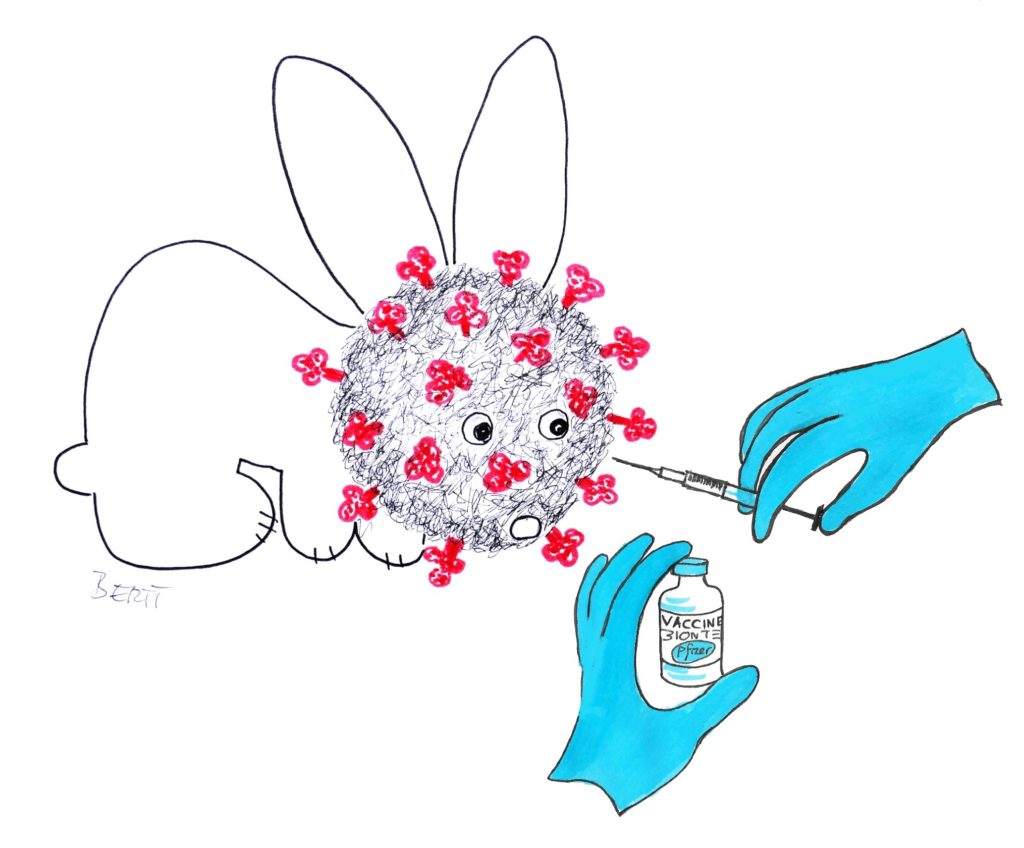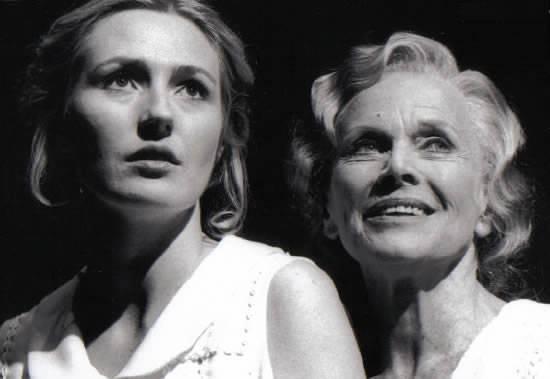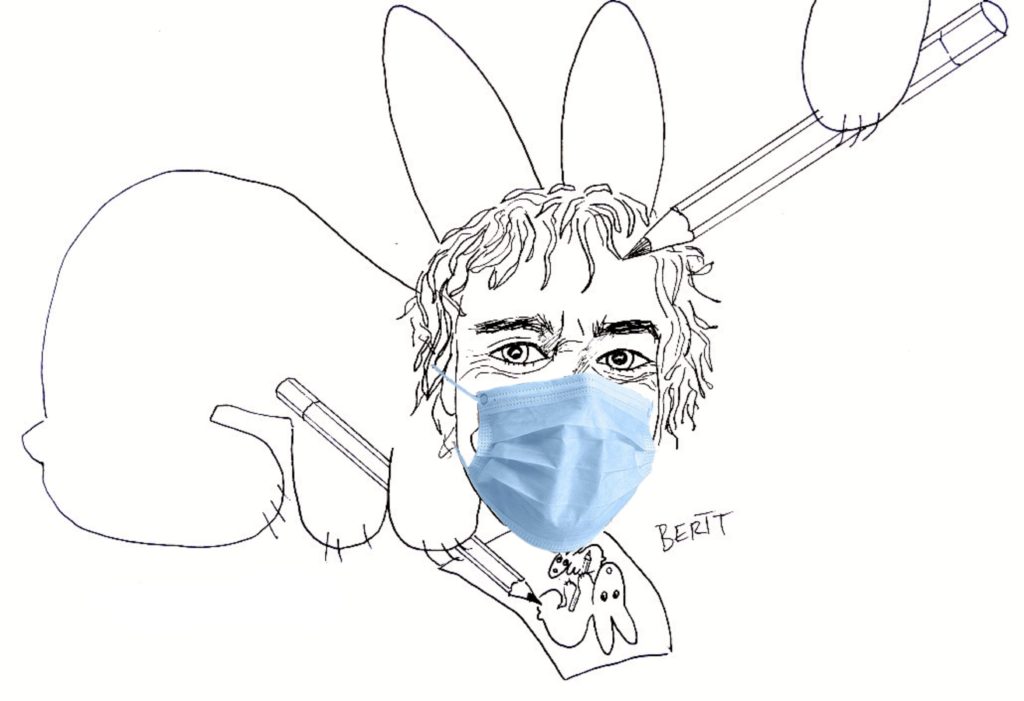
YORK cartoonist Bertt deBaldock’s new volume of rabbit valedictories to celebrities and remarkable individuals covers February 2020 to July 2021.
“That happens to be the period of the start and possible end of the pandemic,” says Terry Brett, the Pyramid Gallery owner and artist behind “The Scribbler” Bertt’s memorial works.
“Hence Good Rabbits Gone 2 has a subtitle, The Covid Years, and the book looks like a strange diary of the pandemic,” he reflects ahead of Saturday’s launch.
The 92 pages contain tributes to luminaries such as Terry Jones of Monty Python, rock’n’roll pioneer Little Richard, World Cup winners Nobby Stiles and Diego Maradona, television and radio personality Tim Brooke-Taylor, forces sweetheart Dame Vera Lynn and Bond Girls Honor Blackman and Dame Diana Rigg, alongside the most venerable Bond, Sir Sean Connery.
“But also there’s a visual list of several pandemic crises such as ‘lockdown’, ‘beer going down the drain’ and the ‘demise of the office’, all portrayed as rabbits,” says Terry.
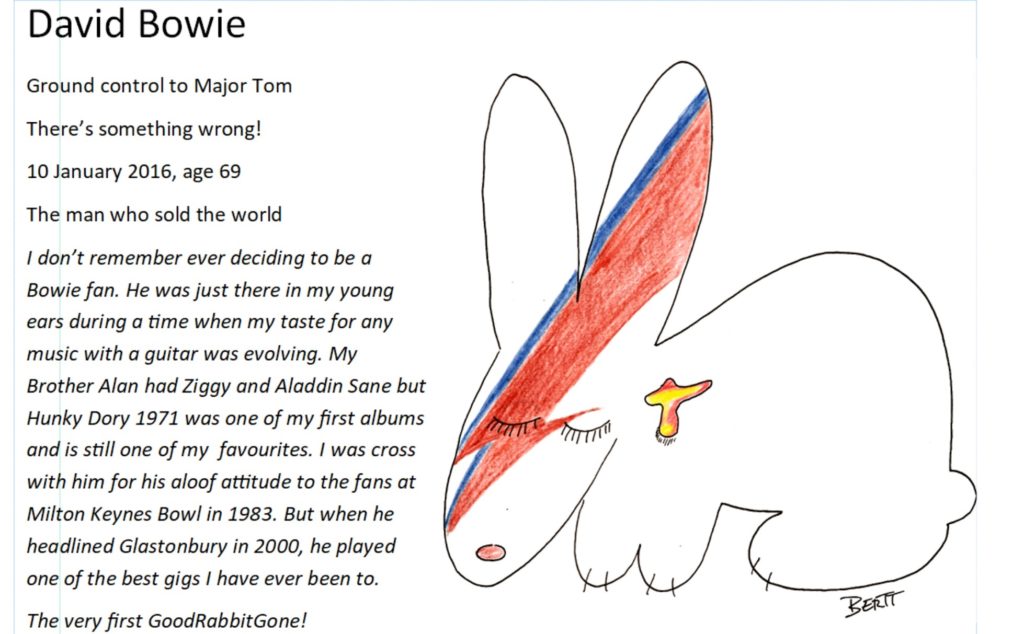
First prompted by the exit stage left of David Bowie on January 10 2016 – the day the music died in a year when it died again and again and again [Prince, Leonard Cohen, George Michael on Christmas Day] – Terry set about drawing cartoons “in a rush” at the time of the “unique individual’s” passing and publishing them on Twitter and Facebook at #GoodRabbitsGone.
He then assembled 64 celebrities, accompanied by his own tributes or memories, in Good Rabbits Gone, Volume One In A Million, published in November 2020 in a Covid Lockdown project where he gave away 200 limited-edition copies and raised £1,700 for St Leonard’s Hospice from donations.
This Saturday, Good Rabbits Gone 2, Volume Two To Infinity will be launched at Pyramid Gallery, in Stonegate, between 11am and 3pm, when Bertt deBaldock will be on hand to sign copies.
Funded by the gallery, the new book again will be given away, and once more voluntary donations to the charity are invited. “From my experience with the first volume, people enjoy being given the book,” says Terry. “Most of those people have then offered a donation, at the gallery or via justgiving.com/fundraising/Terry-Brett6.”
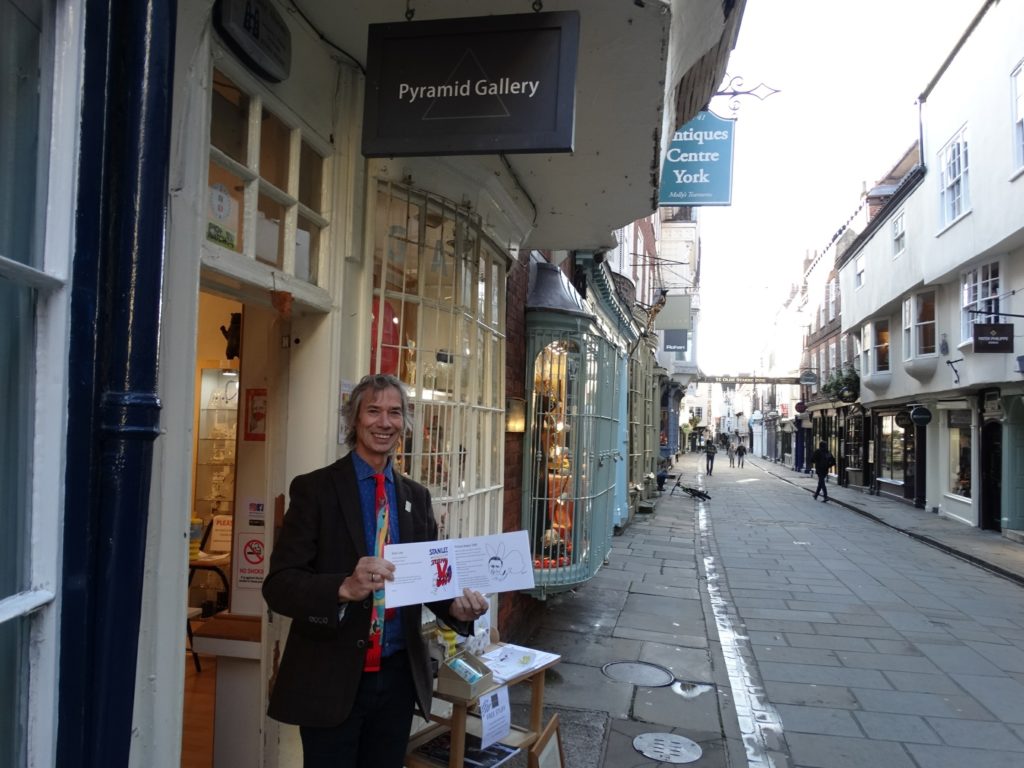
Here, Terry answers CharlesHutchPress’s questions on rabbits, death notices, the balance between imagery and wording, the impact of Covid on Good Rabbits Gone and the choice of charity for donations.
For those new to Good Rabbits, why did you choose rabbits as the motif for your valedictory tributes, Terry?
“When my daughters were ten and seven, they had a pet rabbit, which I looked after. We were making a family wall-hanging using stencils. This rabbit appeared as I was cutting a shape in card using scissors. I’ve now been drawing it on Christmas cards for 26 years.
“When David Bowie died, I felt a great sadness. It just seemed natural to me to draw a rabbit for him. Then, three weeks later Terry Wogan. Gradually I started to add facial features to the drawings. After four years, I had 64 drawings and the pandemic lockdown gave me some time to put them in a book.
“It might seem weird to be creating memorials to people by representing them as a rabbit, but I don’t see the need to question it too much. I find the act of drawing helps relieve the sense of loss and my own anxiety about mortality. The process of reading about the individual’s life and trying to capture a tiny segment of their character in a simple drawing is a little bit cathartic.
“The rabbit body and ears create a limitation in the final drawing, preventing each portrait from being too complicated or serious. All the individuals become united by the addition of rabbit ears!”
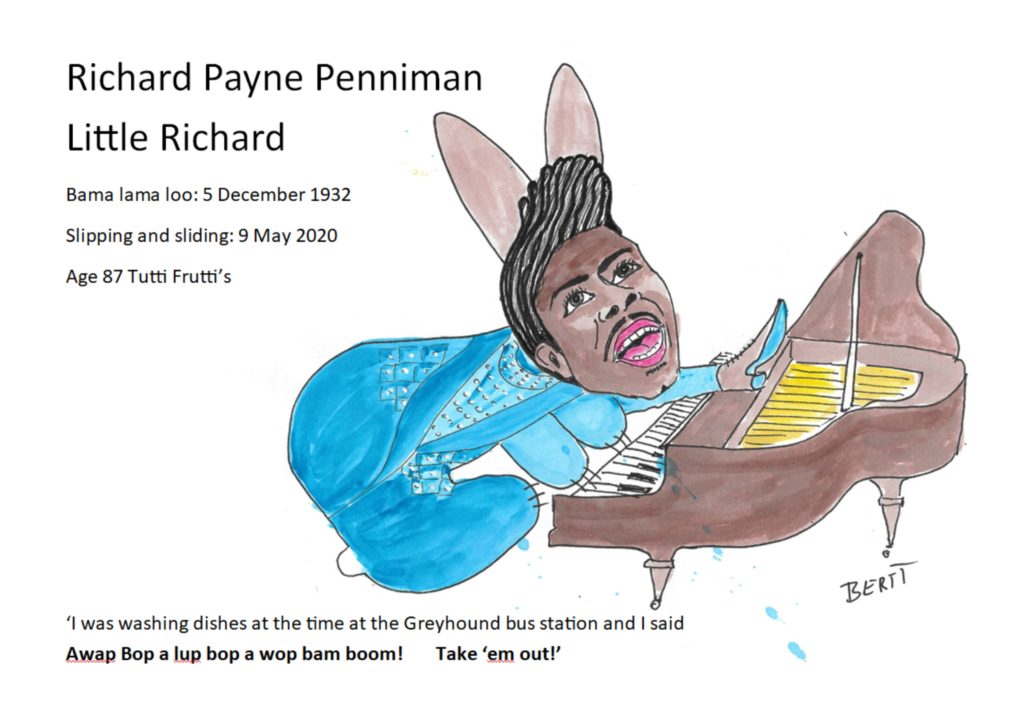
Or, in a nutshell…?
“There’s a long-held belief in the Bertt/Brett household that if you have lived a good life, well, let’s say a mostly good life, i.e. if you have been nice or have achieved something for the benefit of others, then when you die you will become a rabbit.”
How do the newly RIP VIPs qualify for a Bertt deBaldock tribute? Has that changed at all for Volume Two?
“Well, most names who hit the headlines qualify on the basis that they have done something amazing in their life. I can’t really tell whether or not they have actually been a good human being, though with many people there’s so much written about them, that there’s no closet in which to hide the skeletons.
“I was disappointed not to be able include Motown producer Phil Spector, ruled out on the basis that he was found guilty of second-degree murder. There are many others that I could have included, lots of actors and actresses, but I like to find some other attribute in their make-up that goes beyond acting.
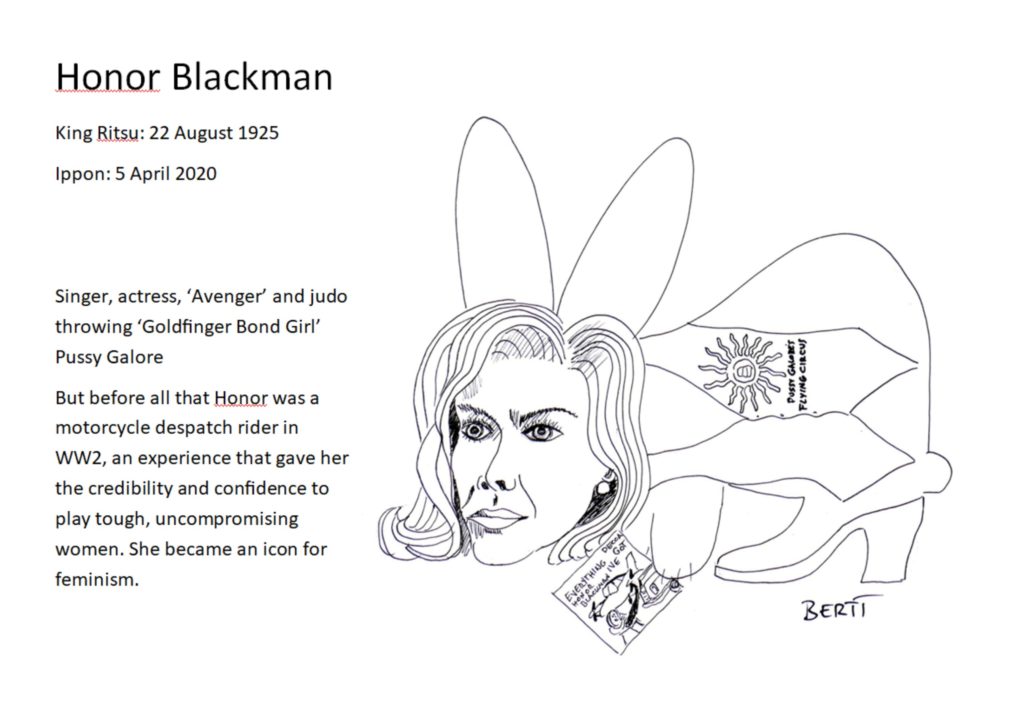
“Honor Blackman, for instance, was a Second World War despatch rider and a judo blackbelt before she became an actress. Reading about iconic individuals fascinates me.”
Do you consider the wording to be as important as the imagery, with much greater scope than on a gravestone?
“I want to make the page entertaining or give the impression that the individual was a person of substance. Some people’s faces, or eccentric dress, say most of what needs to be said, but the addition of a quotation can put across something of great importance to that individual.
“For Albert Roux, I merely added his quote ‘Don’t let love interfere with your appetite’, which says all you need to know about a man who holds food up above all other human needs.
“But I enjoyed adding a bit of humour to that with the dates of his birth and death: Hors D’oeuvres 8 Octobre 1935, Digestif 4 Janvier 2021. As well as being amusing, it tells the reader that he was both a chef and French.
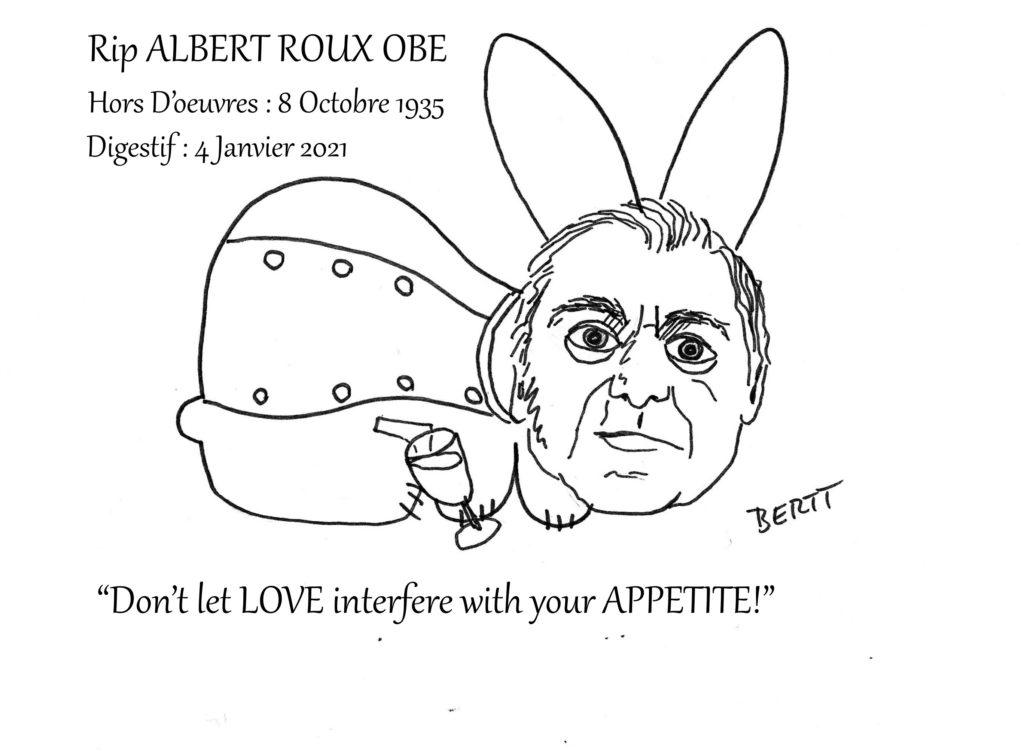
“Sometimes, I like to add an anecdote about myself or my family. Some people have said that these are their favourite pages! For the astronaut Michael Collins, I say only a little about him as Apollo Command Module pilot and the moonwalk by Neil Armstrong, but a lot about me delivering newspapers in the rain, while they were at the crux of their mission. It brings things down to earth a little.”
This set of tributes covers the Covid period: how much does that cast a shadow over the memorials, even prompting the subtitle and your reflection that it “looks like a strange diary of the pandemic”?
“The whole world was in a state of panicked confusion. Some of these great people died of Covid. I was really shocked that Tim Brooke-Taylor was an early victim. I felt that if he can’t be saved, then we are all very vulnerable.
“The book would have been incomplete without some acknowledgement of the pandemic, and I wanted to record some poignant moments, such as the Thursday night applause we gave to the NHS and essential workers.
“I drew the hands clapping in rainbow colours, with the hands gradually becoming rabbits. This is a subtle dig at the Government. If they think that saying thank-you to NHS is enough, then they don’t understand what the public is feeling about the years of under-funding the NHS.
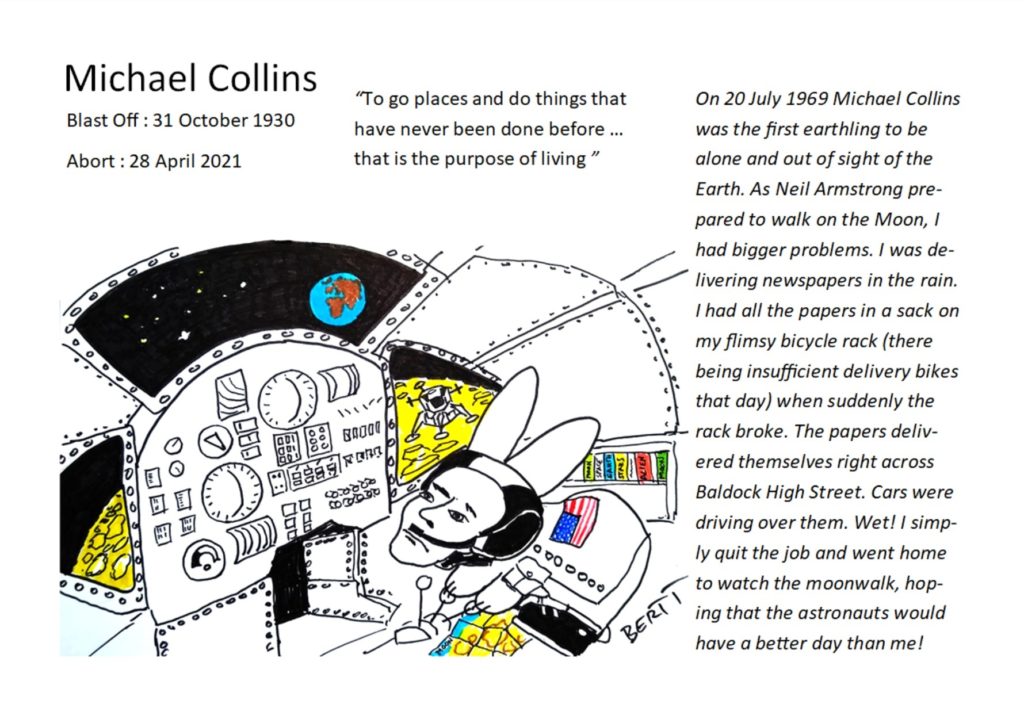
“If all we can do is applaud the NHS for the sacrifices made, then the NHS itself will become a [Bertt] rabbit. Other European nations were better prepared for the crisis than the UK, more ventilators, more nurses and better provision of PPE. It was right to clap for the NHS but they need more funds and better planning.
“I didn’t set out to make points about the politics, but it just couldn’t be ignored. There was also a lot of humour put out on social media about Covid. I think it helps us all get through.”
How have you responded to Covid in the broader subject matter for (with reference to ‘Lockdown’, ‘Beer Going Down The Drain’, ‘Freedom – Italy’ and ‘The Demise Of The Office’)?
“The Demise Of The Office was added in right at the end. It was difficult to find a tag that would be amusing. It’s just a boring subject that I needed to find some humour in.
“I was looking for something to say about the Minke whale that died after swimming up the Thames, which was too upsetting to turn into humour. Once I decided to put these two stories together, it became very poignant. The empty streets tempted the Minke Whale to move in! It’s one of my favourite pages.
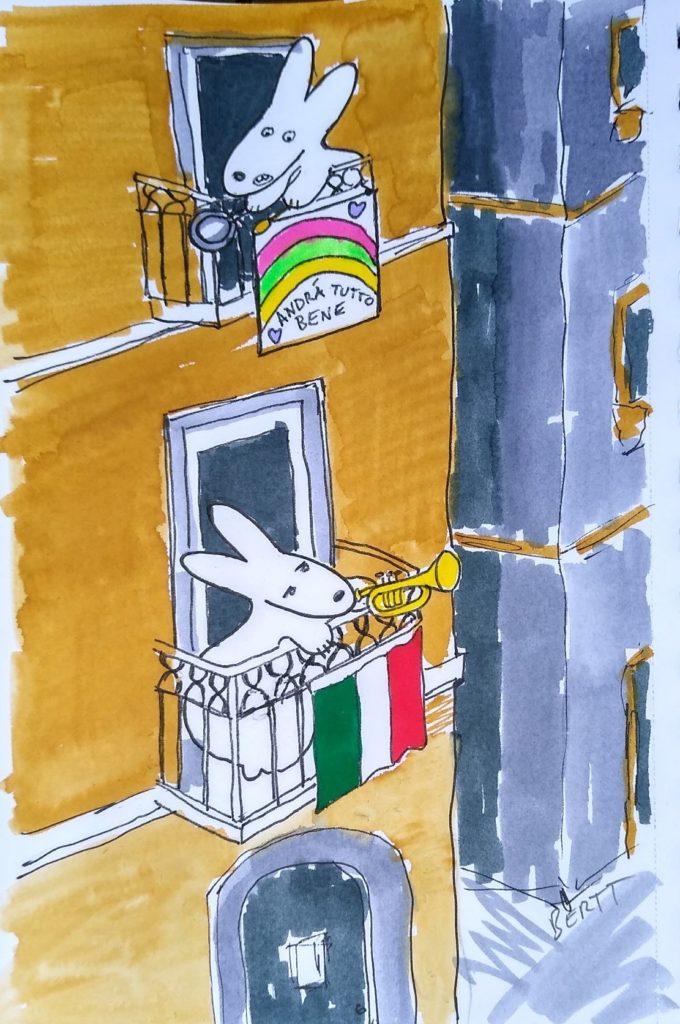
“To keep it light-hearted, I also gave an office block some rabbit ears, as if the building itself has died. The page about ‘Beer’ was fun, though the knowledge that 50 million pints went down the drains was a catastrophe that could have been avoided.”
Usually, your tributes raise a nostalgic smile, but do Covid-related tributes have to be more serious?
“There are only four people featured here that I know for sure died from Covid – Dr Li Wenliang, Tim Brooke-Taylor, Alexander Thynn and Captain Tom Moore – but I suspect that many others have had Covid but it’s just not been mentioned to the press as a cause of death.
“Four Covid cases out of a total 72 people is probably about a third of the proportion of Covid deaths to non-Covid deaths for the whole population, so we should have expected the number in this book to be about 12.
“I had considered including the first nurse and the first bus driver etc who died, but I don’t feel it would be appropriate to make entertainment out of such tragedy. Which makes me question why it seems appropriate to pay tribute in a humorous manner to celebrities. I do wonder if it is appropriate and whether or not they would choose to be included or not, but I can only guess at what their response might be.
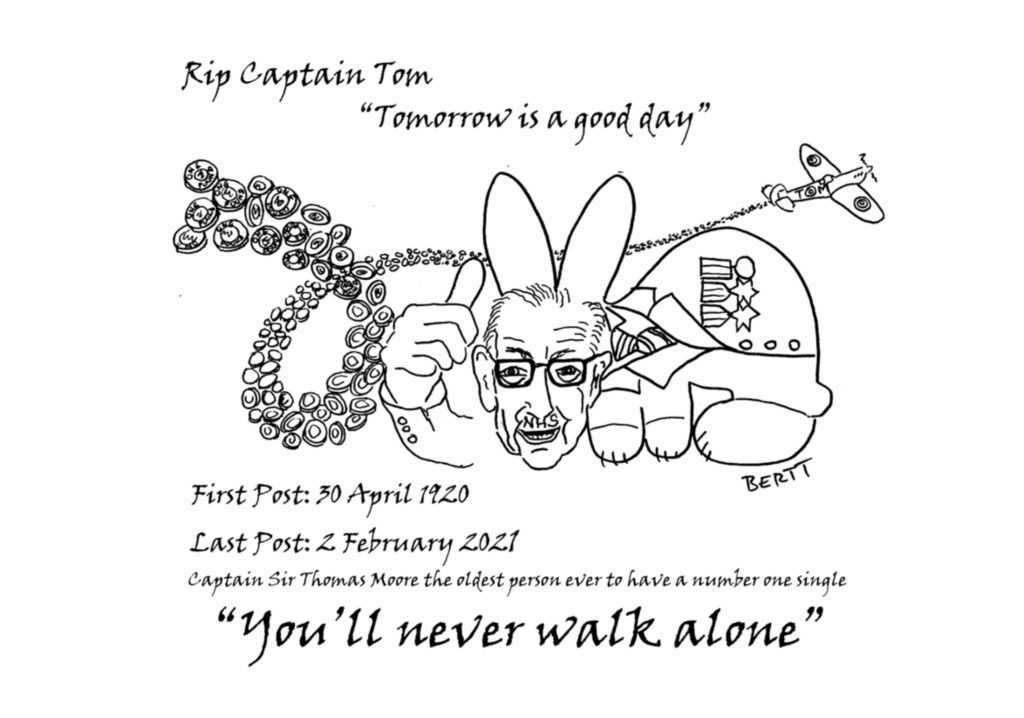
“So, in answer to this question, I think the cause of death makes no difference as to the way I would represent the individual, except perhaps in the case of Dr Li Wenliang, whose demise was especially sad, unjust for political reasons, premature and included here to make a point about the gross ineptitude of the authorities and leaders in China, who could have mitigated the effects of the virus by making different decisions.
“In a broader sense, I hope that most of the individuals here, if they could make a comment, would like what I have done or at least find it mildly amusing, though some of the scribbled portraits might not really do the person justice!
“I would love to know what the Queen would think of my tribute to Prince Philip, but I’m not expecting a knighthood for it. We are very fortunate to live in a culture that allows freedom of expression without fear for our lives!”
Why will donations be going to St Leonard’s Hospice from the charity launch night?
“My father died of prostate cancer at the too early age of 76. Partly because he wasn’t diagnosed. I asked him if was angry about the disease and he told me to go and get a test. I felt sorry for him because he was in denial about his predicament.
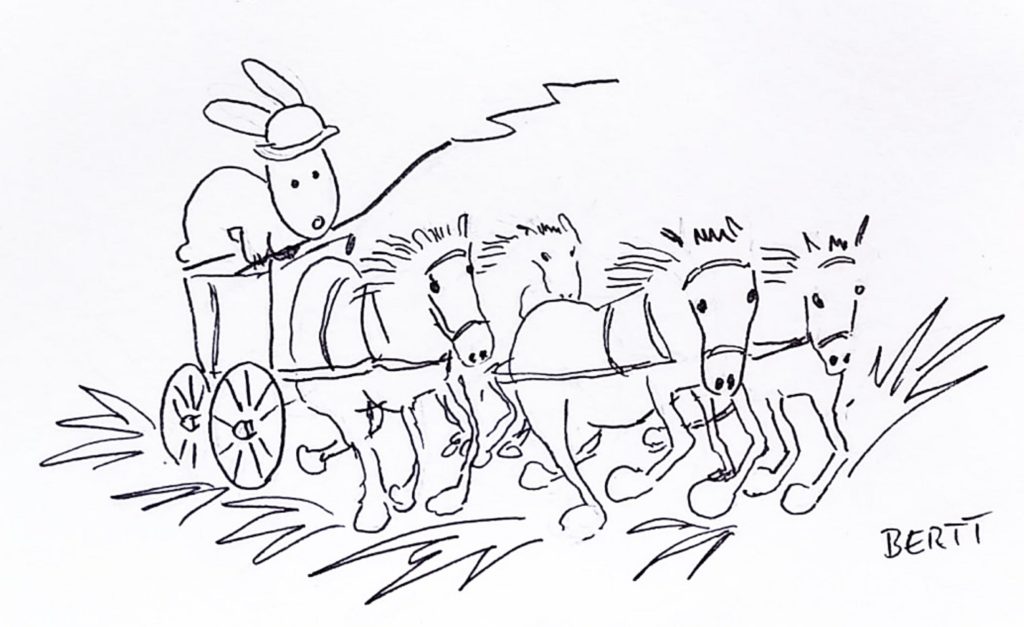
“He simply carried on life as if there was nothing to concern himself about, but when the time came, he booked himself into a hospice and died the next day. I think the existence of the hospice allowed him to take control and make that decision. You cannot just book yourself into a hospital and who would want to?
“The hospice doctor simply chatted to him and asked him what he wanted, to which he answered, ‘ice cream’. He was dead two hours later. I’m proud of him for that. And I want to tell everyone that dying can be dignified and that the hospice movement do this very well.
“I have supported St Leonard’s Hospice ever since that day. The hospice is largely funded by donations from individuals, as well as government grants. I feel the hospice needs to have independence.”
Bertt deBaldock/Terry Brett launches Good Rabbits Gone 2 at Pyramid Gallery, Stonegate, York, on Saturday (16/10/2021) with a book-signing session and charity fundraiser for St Leonard’s Hospice from 11am to 3pm.
